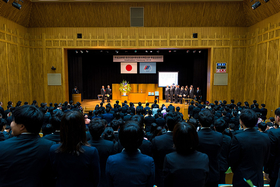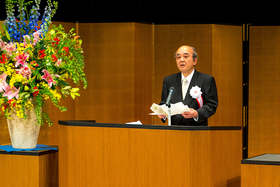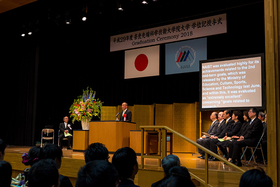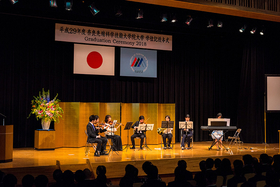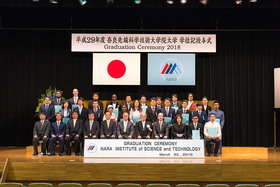2018/03/23
On Friday, March 23, 2018, a graduation ceremony was held in the Millennium Hall and 401 students received diplomas.
At the ceremony, President Yokoya handed over diplomas to the students and gave them a congratulatory speech, followed by the speech of Mr. Shigekazu Nakamura, the Executive Director of the Foundation for Nara Institute of Science and Technology.
Then Best Student Awards were conferred to 14 winners by the Foundation.
In addition, the chamber music ensemble composed of students and staff volunteers, which has become annual tradition, performed.
At the party held after the ceremony, graduates enjoyed the party together with President, Executive Directors and their supervising professors in a friendly atmosphere.
*Number of Graduates in March
【Master's Graduates】
Information Science 132 (6 International students)
Biological Sciences 93 (3 International students)
Materials Science 94 (4 International students)
【Doctoral Graduates】
Information Science 34 (14 International students)
Biological Sciences 20 (3 International students)
Materials Science 25 (5 International students)
【Graduates who completed the Doctoral program by submitting the dissertation】
Biological Sciences 3
Total 401
【Congratulatory Remarks to Graduating Students】
I would like to offer my heartfelt congratulations to 319 master's and 82 doctoral students who have been awarded degrees today. I would also like to congratulate the families of today's graduates.
Also, on behalf of NAIST, I would like to express our gratitude to all the individuals and groups who have supported both the international and Japanese graduates in their studies and lives.
This academic year the Graduate School of Materials Science, the last graduate school to be established at NAIST, celebrates its 20th anniversary, and, including the graduates here today, NAIST has conferred 7,601 master's degrees and 1,505 doctoral degrees. The number of graduates is nearing 10,000 and NAIST's network of graduates is growing year by year.
This network is expanding throughout the world. Among today's graduates are 35 international students from 14 countries, bringing the total number of NAIST graduates from overseas to 542 from 62 countries.
Of the master's course graduates, some will continue their studies in the doctoral program to become researchers, and others will enter the workforce, starting new lives in society as professional researchers and engineers. Also, many of the doctoral course graduates will start their careers as professional researchers. How do you envision your future?
Currently, science and technology is facing an era of revolutionary changes. The keywords in science and technology for the past few years have been Internet of Things (IoT), artificial intelligence (AI) and big data, which are supported by the progress of ICT technology, both in software and hardware.
With these ICT technological innovations, research methodology throughout all fields has been reevaluated, and the influence of this in science and technology fields outside of information science cannot be ignored. For example, in the field of biological sciences the research area called bio-informatics has been established, and materials informatics is suddenly emerging in the field of materials science.
It can be said that, in pursuit of a 'Super Smart Society' in which a myriad of things are connected to the internet fusing the 'cyber world' and the 'real world' and which is based upon analysis of huge amounts of real time-collected data that may be accessed from around the world through networks, a new research paradigm is developing called 'data-driven science' or 'AI-driven science.
You have explored the depths of your individual areas of research in the different fields of information, biological and materials sciences and I believe that you have not had the chance to perform research together spanning different research areas and fields. However, in the near future there is a strong possibility of you working on the same team working towards the same goal.
This revolutionary age of science and technology will have great effects on society, and it is currently thought that, in the 2040's, the majority of the jobs existing today will disappear and new job types will appear. This means that many people will be faced with changing careers and, in some fields, this is already being seen.
In the 2040's you will be the central part of society.
So... let me ask all of you. What do you think will be required of you in the future? The following 4 attributes are often used in reference to researchers in science and technology.
- A 'spirit of challenge' to cultivate new knowledge based on their own knowledge, creativity and research skills.
- 'Well-roundedness' to use knowledge of traditional research fields for hypotheses, while maintaining a broad, comprehensive view various compartmentalized knowledge.
- 'Multi-disciplinary understanding' to produce new academic fields through cooperation and collaboration with researchers from various fields.
- A 'global perspective' to strive to contribute beyond national borders, obtaining global recognition of your original research through discussion and verification within the global science community.
These attributes, a 'spirit of challenge', 'Well-roundedness', 'Multi-disciplinary understanding' and a 'global perspective', do not solely apply to those who will undertake research. Regardless of your profession, I hope you lead the way to the next generation by actively pursuing future societal creations and developments as talented resources that can open new research fields by flexibly responding to societal changes through a holistic understanding.
And for this, I believe it is important to always have the courage and strength to 'take the first step' in any activity.
At NAIST you have not only gained academic expertise in your respective fields, but also, through your thesis research, you have the valuable experiences through which you developed the ability to identify problems, explore and implement solutions to these problems, evaluate the outcomes, and write academic papers on the outcomes through discussions with people having various viewpoints.
While this experience may have presented you with difficulties at times, I am confident that the network you have created here, the 'kizuna' or individual ties you have made, will assure your future.
NAIST's role do not end with us sending you out into society. Rather, the NAIST faculty and staff considers our role as facilitating the building of strong relationships with alumni so that each and all of you will be able to actively approach new challenges and continue your creative lives in an ever-changing community of science and technology.
Last year on Sunday Nov. 12, we held our Homecoming Day and this is to be an annual event held every year. We hope that you will come and visit us at that time. Additionally, NAIST is strengthening its international network of graduates who are active around the globe through international satellite offices established in Indonesia and Thailand. We hope that you participate in and assist our pursuits.
In concluding my message, I would like to congratulate all of you again. We look forward to your continued successes and offer our support for your future endeavors.
Naokazu Yokoya, President,
Nara Institute of Science and Technology, March 23, 2018


